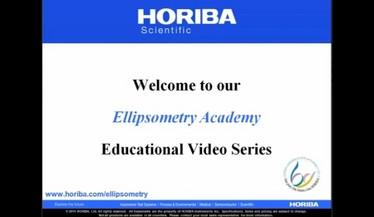Videos & Webinars

Learn more about spectroscopic ellipsometry by viewing educational videos and discover some of the applications with our collection of webinars.
Spectroscopic ellipsometry is a surface-sensitive, non-destructive, non-intrusive optical technique widely used for thin layers and surface characterization. It is based simply on the change in the polarization state of light as it is reflected obliquely from a thin film sample. Depending on the type of material, spectroscopic ellipsometers can measure thickness from a few Å to tens of microns. It is also an excellent technique for multi-layers measurement.
Spectroscopic ellipsometry allows a range of thin film properties to be characterized, like layer thickness, optical properties (n,k), optical band gap, interface and roughness thickness, film composition, uniformity by depth and area, and more.
Materials suitable for spectroscopic ellipsometry include semiconductors, dielectrics, polymers, organics, and metals. Ellipsometry can also be used to study solid-liquid or liquid-liquid interfaces.
HORIBA spectroscopic ellipsometers use innovative technology to perform high frequency polarization modulation measurements without any mechanical movement, thus giving a faster, wider range and higher precision of characterization when compared to conventional ellipsometers.
Spectroscopic Ellipsometer from FUV to NIR: 190 to 2100 nm
Spectroscopic Ellipsometer for Simple Thin Film Measurement
Powerful and Cost Effective Spectroscopic Ellipsometer
Do you have any questions or requests? Use this form to contact our specialists.